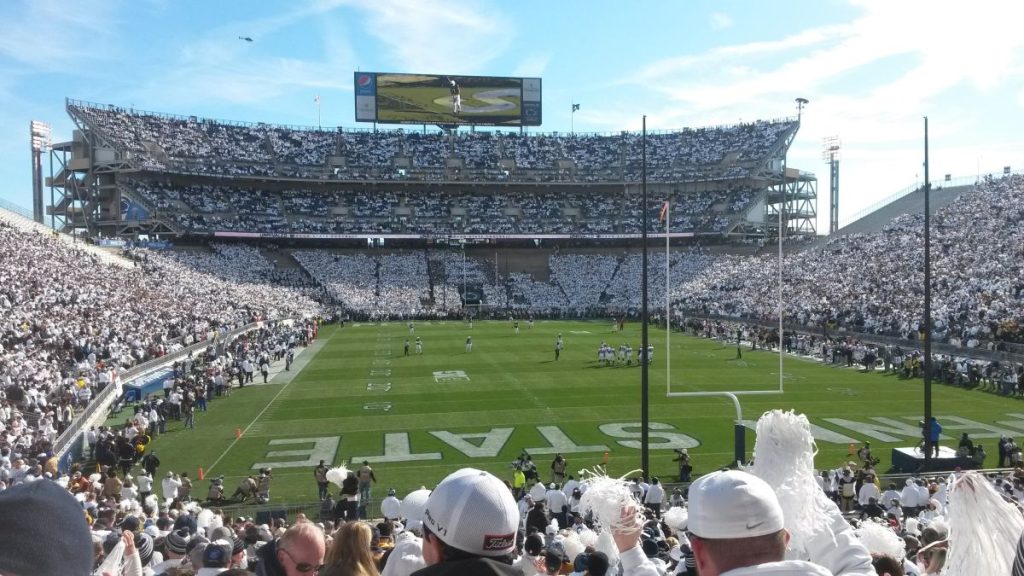By Greg Woodman

Earlier this year, an ESPN article asked a provocative question: “As college sports face more change, is private equity money coming in?” The sweeping disruptions occurring in college athletics—shifts in player compensation, NIL deals, and skyrocketing media rights—have opened the door for new ideas and, potentially, new investors. Private equity firms, constantly on the lookout for underutilized markets with high potential, may have their eyes set on college athletics as the next frontier.
In Happy Valley, we’ve already seen private equity bring new life and opportunity to landmarks like The Nittany Lion Inn and, soon, The Penn Stater. These historical icons have been given a second wind, and it’s worth wondering—could private equity do something similar for Penn State football?
Penn State Football: A $3 Billion Opportunity?
Imagine if Penn State football took a leap beyond the boundaries of collegiate athletics and transitioned into a professionally funded model. This is, admittedly, a big leap, but let’s explore what that might look like.
Penn State has long been a financial powerhouse in college sports, generating significant annual revenue—often surpassing $100 million—from ticket sales, broadcasting rights, sponsorships, licensing, and alumni donations. In today’s shifting landscape, where schools are now allowed to pay players directly on top of their NIL deals, it’s not unthinkable that private equity might “come to town,” eyeing the opportunity presented by what could become, in many ways, a professional football operation.
Drawing Parallels: The Washington Commanders
Let’s use a professional team, like the Washington Commanders, as a reference point. Recently valued at $7 billion, the Commanders show us what an iconic brand, even one with challenges, can command in the sports marketplace today. Penn State football may not be an NFL franchise, but it has a lot of similar components—a loyal fan base, a massive stadium, and a history of success. Could a professionally operated Penn State football program find itself in a similar valuation range?
Consider these factors:
- Revenue Generation: Penn State football already brings in over $100 million annually. If it were to operate as a private equity-backed professional team, revenue streams like broadcasting, merchandising, and digital content could be maximized even further. With the added financial resources of private equity, the sky might be the limit.
- Fan Base: With an incredibly dedicated fan base, both regionally and among alumni, Penn State’s following rivals many professional franchises. The Washington Commanders benefit from a broad NFL market, but Penn State’s alumni network is massive, and their loyalty could serve as a bedrock for growth if new opportunities, like a larger national or even global reach, were explored.
- Stadium Value and Assets: Beaver Stadium, one of the largest in the country, adds tangible value. While the stadium is aging and would likely require updates to meet modern standards, it still serves as an iconic asset that enhances the program’s valuation.
- Brand Equity: Perhaps the biggest intangible is Penn State’s brand equity. With decades of tradition, success, and a connection to the Big Ten conference, the brand is synonymous with college football itself. This historical strength adds considerable value that would influence any valuation discussion.
Speculating on Valuation
If we play out this speculative scenario, a valuation between $2 billion and $5 billion for Penn State football is not unrealistic. While the program would have some revenue limitations compared to an NFL team—like lower TV deal revenue or restrictions on player salaries—these could be offset by strong fan loyalty, a massive stadium, and a historically successful brand.
Crunching the Numbers for Private Equity
Private equity firms often use a multiple of earnings when determining an acquisition’s value. Let’s assume that as a professional team, Penn State football could generate about $200 million annually in revenue, with a profit margin of around 20%. That’s approximately $40 million in annual profit.
Using a typical EBITDA multiple for professional sports franchises, which ranges from 10 to 15 times earnings, we could estimate a valuation like this:
- Low End: 10x $40 million = $400 million
- High End: 15x $40 million = $600 million
However, the true value of Penn State football isn’t just about annual profit—it’s also about assets like Beaver Stadium, the brand equity it has built over decades, and future growth potential. When you factor these elements in, a private equity firm would likely need to pay $2 billion to $3 billion to acquire Penn State football if it were ever put up for sale.
Challenges to Privatization
Of course, there are significant hurdles to this vision. College sports programs are part of their universities, and in Penn State’s case, it’s a public institution that answers to the state and alumni. Transitioning to a privately owned model would require major shifts in NCAA rules and face cultural resistance from fans who value the amateur spirit of college football. These are not minor challenges—they are monumental, and any potential buyer would need to navigate them carefully.
But in a landscape where private equity is already making inroads in unexpected places, nothing is entirely off the table.
What’s Next?
The concept of private equity in college sports is bold, fraught with challenges, but also filled with opportunity. As the world of college athletics continues to evolve—moving further into territory once reserved for professional sports—Penn State football could represent a new kind of opportunity.
What do you think? Could private equity be the future of Penn State football, or any other major college program? We’d love to hear your thoughts—comment below.






